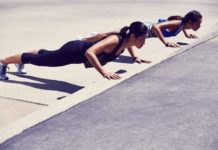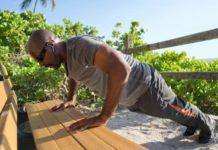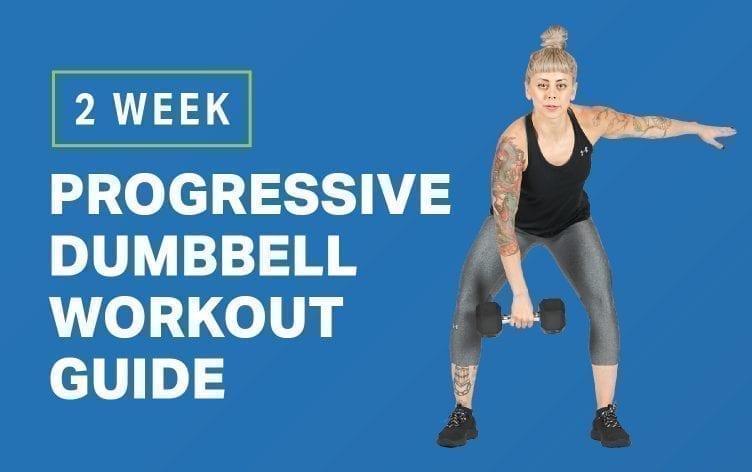
2-Week Progressive Dumbbell Workout Guide
The dumbbell is one of the most versatile and popular pieces of fitness equipment worldwide. Dumbbells allow for thousands of unique movements and exercise variety. Additionally, adding weight as strength progresses makes them a perfect fitness tool for all levels and goals.
For this two-week program, we narrowed down thousands of options to 12 basic exercises that challenge all of the body’s foundational movements. Sets are timed, with a goal of gaining strength through slow, controlled movements. The weight selected should allow you to come close to failure at the end of every set, without sacrificing proper movement patterns.
If you don’t have dumbbells on hand, no problem. Here are some dumbbell alternatives you may find lying around your house:
- Soup cans
- Detergent bottles
- Milk jugs filled (or partially filled) with water
- Filled water bottles
- Books
- Cast-iron skillets
- Backpacks, filled or unfilled
- Bottles of (white) wine
- Rocks
- Small children
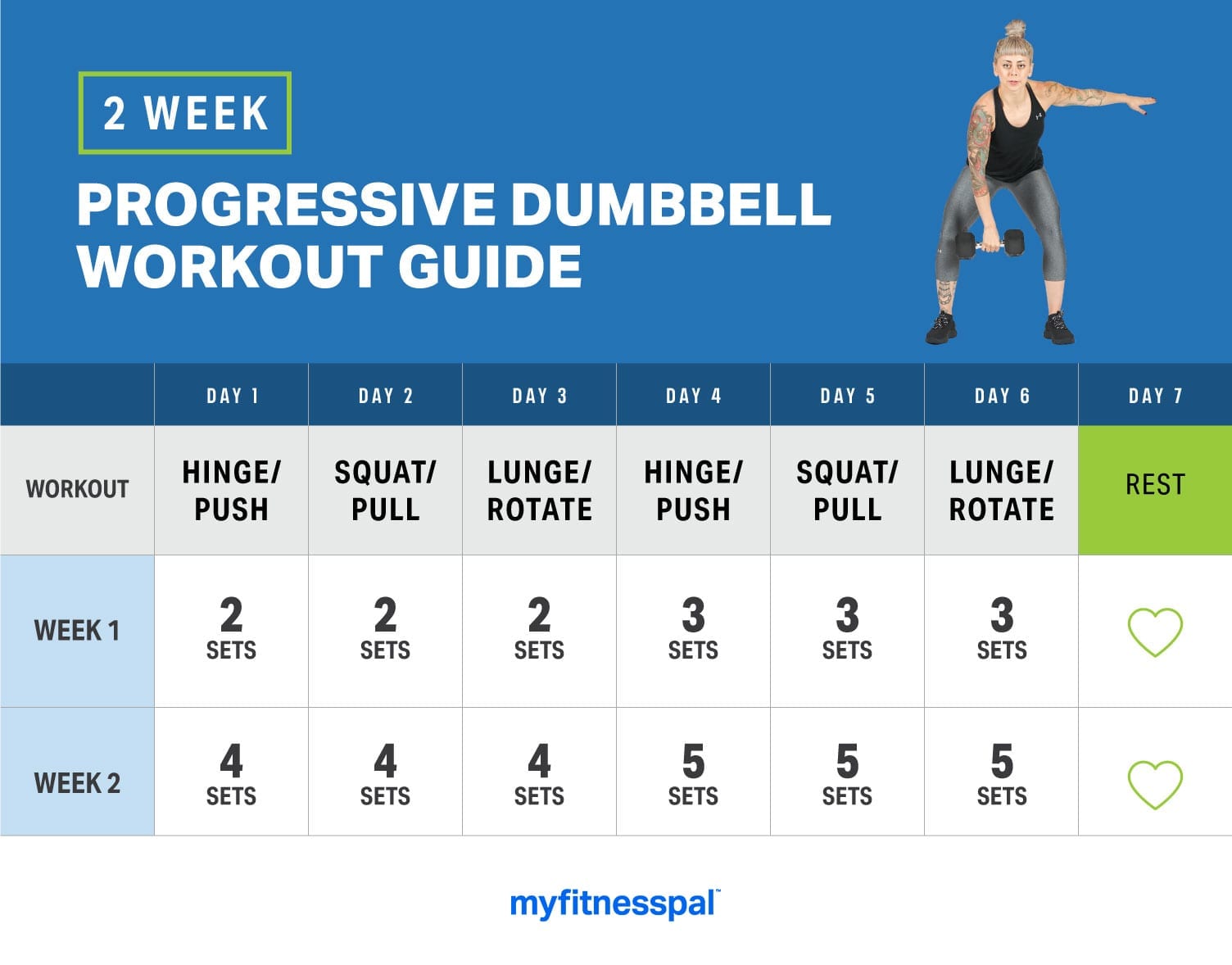
CIRCUIT DESCRIPTIONS
HINGE/PUSH CIRCUIT
30-second sets of each exercise, with 30–60-second recovery between sets
- Dumbbell snatch (each side)
- 1-leg dumbbell Romanian deadlift (each side)
- Dumbbell floor press
- Dumbbell (kettlebell) windmill (each side)
SQUAT/PULL CIRCUIT
30-second sets of each exercise, with 30–60-second recovery between sets
- Dumbbell thruster
- Dumbbell goblet squat
- Dumbbell 3-point bent over row
- Dumbbell renegade row
LUNGE/ROTATE CIRCUIT
30-second sets of each exercise, with 30–60-second recovery between sets
- 1-arm farmer carry (each side)
- Dumbbell split squat (each side)
- Dumbbell side plank with rotation (each side)
- Curtsy lunge with dumbbell (each side)
EXERCISE DESCRIPTIONS
DUMBBELL SNATCH
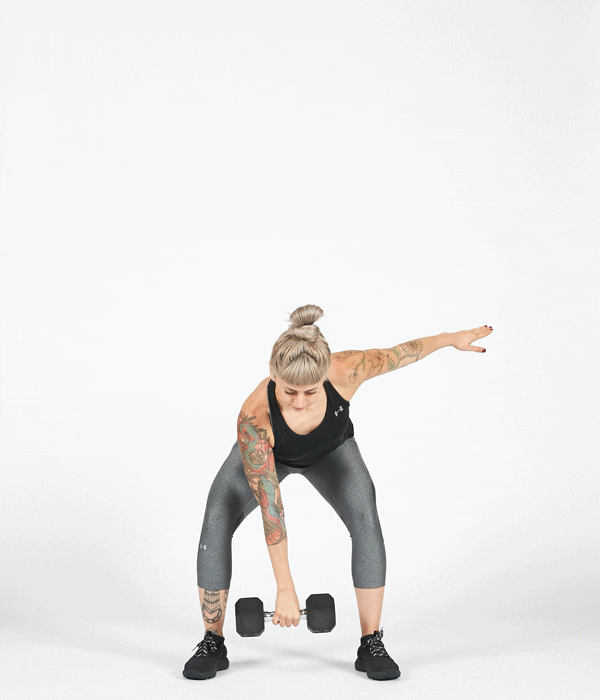
The move: Begin by holding a dumbbell in one hand. Hinge the hips back and lower the bell to just above your knee. Simultaneously unhinge your hips, pull the dumbbell up along your body, and bring it overhead with speed and power.
1-LEG DUMBBELL ROMANIAN DEADLIFT

The move: Begin by holding a dumbbell in the opposite hand of the planted foot. Keep a neutral spine and only a slight bend in the planted leg as you hinge forward, keeping square with the ground. Once the end range of a flat torso is reached (your body should form a capital T if you have the mobility) lower that leg back to the ground.
Care should be taken to ensure a neutral spine throughout the entire movement. Forward flexion not only takes away from the exercise but also puts excessive strain on the lumbar spine.
If you are struggling with perfect form, ditch the weight and first master the hip hinge.
DUMBBELL FLOOR PRESS
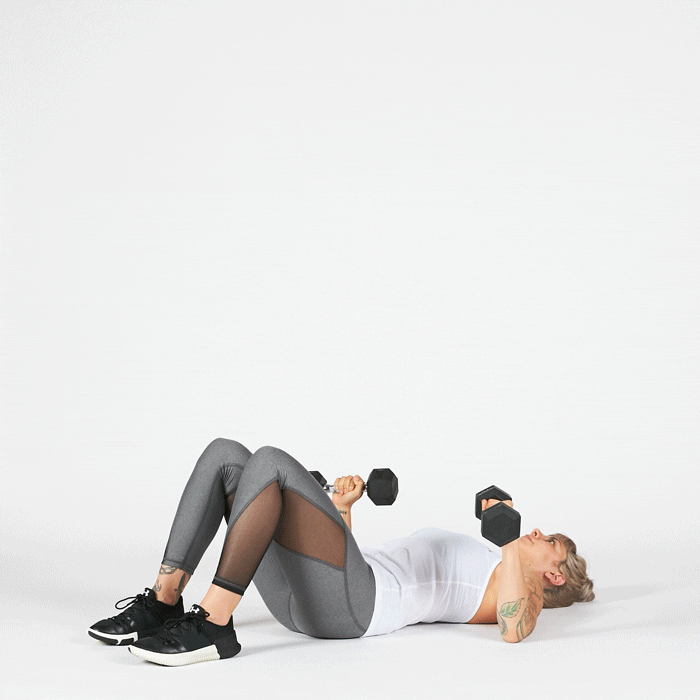
The move: Grab two dumbbells and safely lay on the ground. Press both bells up toward the ceiling, then lower them down, stopping just before your elbows touch the floor and repeat.
For less strain on the shoulders, turn your palms in facing one another during the press.
DUMBBELL WINDMILL
The move: Take a wide stance and point your toes 45 degrees to the left. Place a dumbbell in your right hand, and extend that arm overhead. While keeping your eyes on the dumbbell, pop the right hip out and hinge sideways, still maintaining a neutral spine. Go as low as you can go pain-free with a flat back, then press the dumbbell back up to the ceiling. This movement should be slow and controlled, with straight legs.
Try it without a dumbbell until you master the movement pattern.
DUMBBELL THRUSTER

The move: Begin with both dumbbells positioned by your ears. Lower down into a squat, as low as you can safely go. Explosively press through the floor, stand up, and drive your arms up to the ceiling. Lower down, controlled, and repeat.
DUMBBELL GOBLET SQUAT

The move: Hold a dumbbell vertically by one end against your chest. Your feet should be a little wider than shoulder-width apart with toes turned out slightly (the less mobile the hips, the more the toes will need to turn out). Drop the hips straight down to the floor with the chest open and shoulders anchored down and back. Pretend you are separating the floor with your feet and engage your glutes as you power back up to the starting position.
This can be done as a bodyweight squat to lower the load.
DUMBBELL 3-POINT BENT-OVER ROW
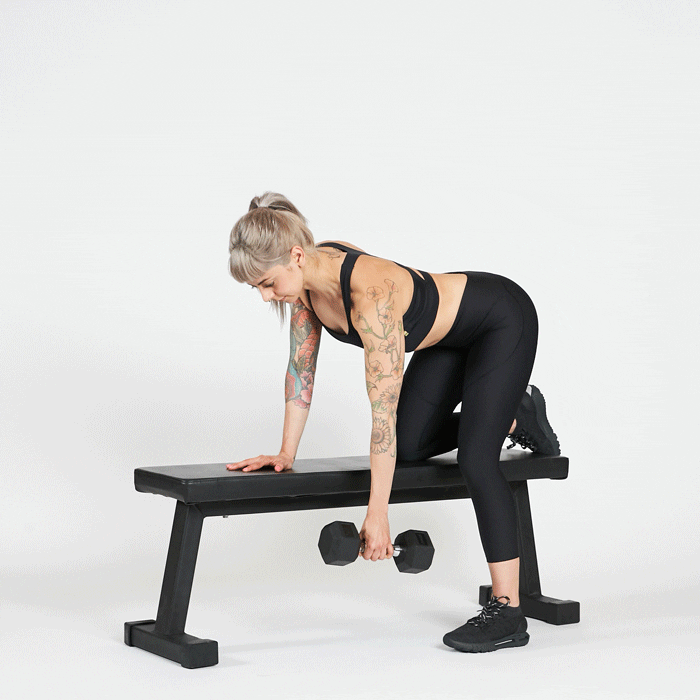
The move: While holding a dumbbell in your left hand, position your right hand and right knee on a bench or table with your left foot planted firmly on the ground. Ensure the spine is flat. Engage behind the left shoulder blade and lift the dumbbell up to the ribcage. Lower slowly and repeat.
DUMBBELL RENEGADE ROW

The move: Begin in a straight, tight plank position with feet wide for support. Avoiding rotation, row one dumbbell up at a time, squeezing behind the shoulder blade. Avoid letting the hips sag (especially during the row) to prevent low-back pain and potential injury.
This can be done on the knees and/or without weight to reduce the intensity.
SINGLE-ARM DUMBBELL FARMER CARRY

The move: Place a dumbbell in one hand and let it hang to the side. Walk forward with a regular stride pattern while minimizing rotation, swinging, depression or elevation of the weighted arm.
DUMBBELL SPLIT SQUAT
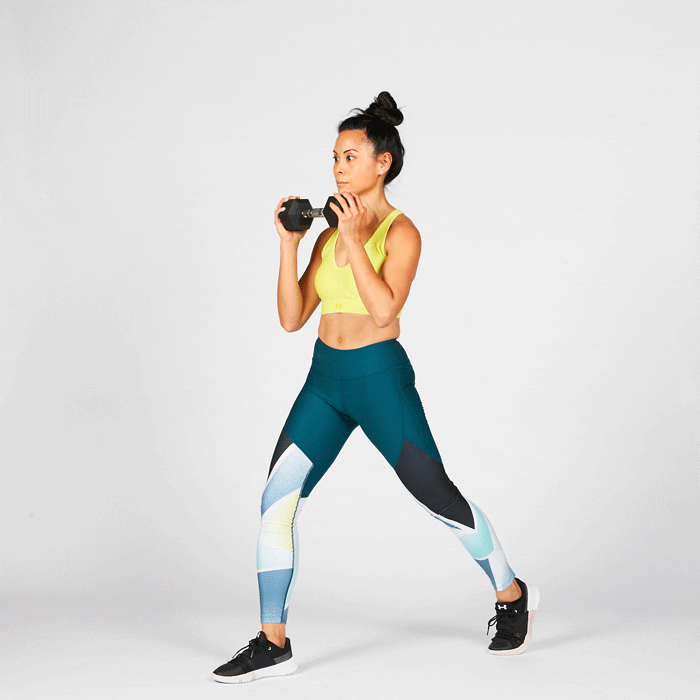
The move: Begin in a split stance with about a foot of space laterally between your left and right foot. Holding the dumbbells in your hands, maintain a strong, solid posture. Bend both knees to 90 degrees, engage the glutes and press up off of the floor.
If knee pain is an issue, try doing these bodyweight only or reducing the range of motion.
DUMBBELL SIDE PLANK WITH ROTATION
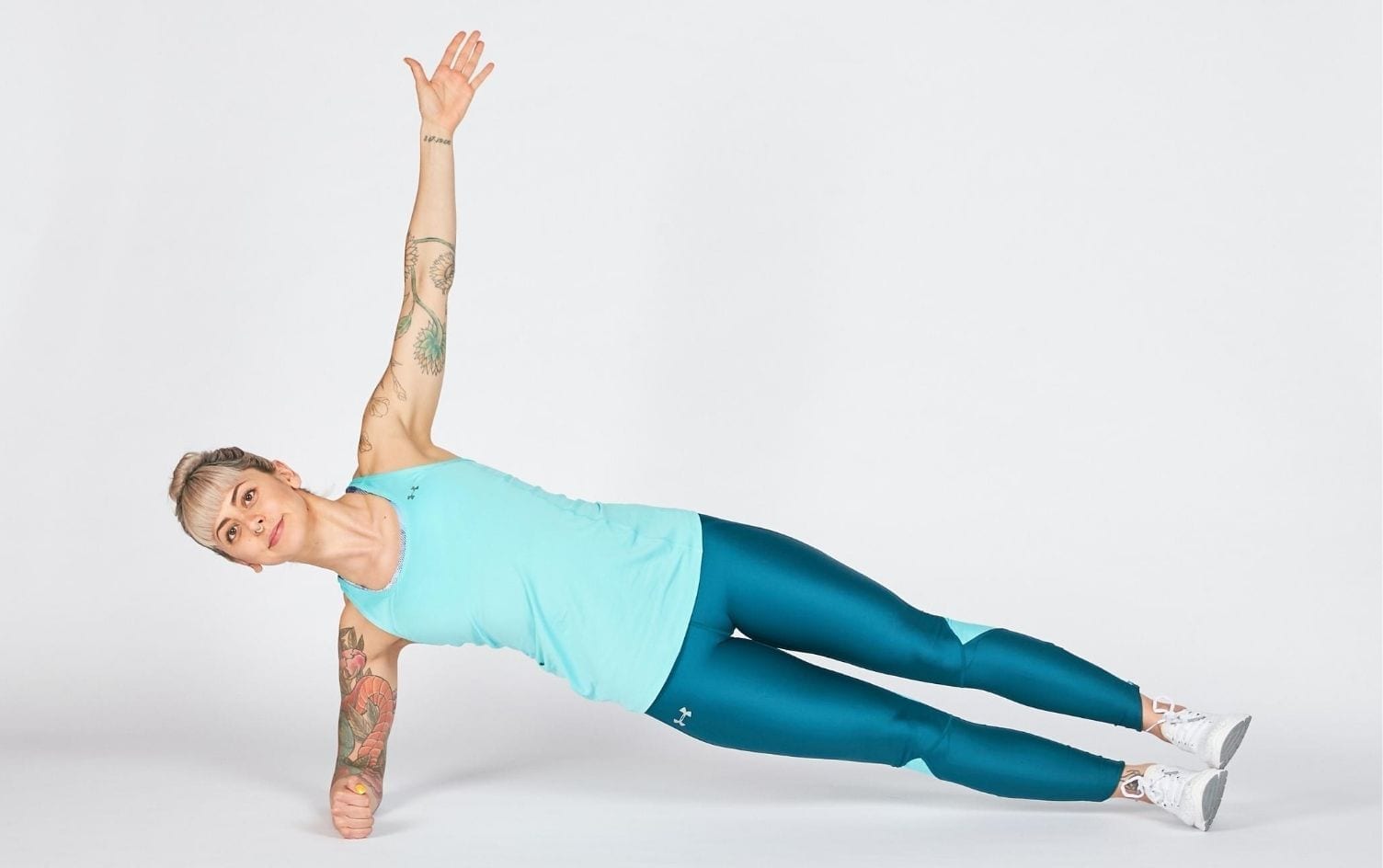
The move: Line your elbow up with your shoulder and your shoulder with your hip and heel. With a very tight and braced core, push the ground away from you, staying active in the shoulder joint. Reach your top arm under your body while simultaneously raising your hips. Return to a solid and straight plank position.
To reduce the intensity, perform this exercise as a side bridge from the knees instead of the feet and/or ditch the dumbbell.
CURTSY LUNGE WITH DUMBBELLS

The move: Begin by standing with your feet shoulder-width apart and dumbbells hanging by your sides. Step one leg behind and beyond the other and bend both knees. When your front thigh is almost parallel with the floor, return to the beginning posture.
Check out “Workout Routines” in the app to discover and log a wide variety of routines, or build your own routine with exercises that fit your goals.


























